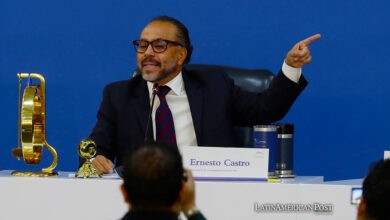Mexico to Contest Texas’ New Migrant Arrest Law
Mexican President Andres Manuel Lopez Obrador announced plans to legally challenge Texas' controversial new law authorizing state law enforcement to arrest suspected undocumented migrants, denouncing it as 'inhumane.

12/19/2023.- Mexican President Andrés Manuel López Obrador speaks during his morning press conference today at the National Palace in Mexico City, Mexico. EFE/Mario Guzman
The Latin American Post Staff
Escucha este artículo
Leer en español: México impugnará la nueva ley de arresto de inmigrantes de Texas
In a bold and unprecedented move, Mexican President Andres Manuel Lopez Obrador declared his government's intention to challenge a new Texas law legally. This law, recently signed by Texas Governor Greg Abbott, grants state law enforcement the authority to arrest individuals suspected of being undocumented migrants. President Lopez Obrador's response underscores a growing tension between Mexico and Texas over immigration policies and human rights issues.
The legislation, enacted on Monday by Republican Governor Abbott, represents a significant shift in immigration enforcement within Texas. Traditionally, immigration enforcement has been the purview of the U.S. federal government. However, this new state law departs from this norm, allowing local Texas officers to assume roles typically reserved for federal agents.
Operation Lone Star: Governor Abbott's Broader Initiative
Governor Abbott's move is part of a broader initiative, Operation Lone Star, which he has spearheaded in recent years to combat illegal immigration. This initiative has seen the deployment of the National Guard and the installation of physical barriers such as concertina wire along the Texas-Mexico border. Additionally, a floating barrier has been placed in parts of the Rio Grande, further solidifying the state's efforts to curb unauthorized crossings.
Mexican President Lopez Obrador, a left-leaning leader, has frequently disapproved of policies implemented by Republican governors like Abbott and Florida's Ron DeSantis, particularly in his morning press conferences. He has gone as far as urging Mexican-Americans not to vote for these figures, citing their harsh immigration stances.
President Lopez Obrador's statement about the new Texas law was unequivocal: "The foreign ministry is already working on the process to challenge this law," he said. The Mexican President criticized Governor Abbott's motives, suggesting that the Texas governor's actions are aimed more at gaining popularity than addressing immigration issues effectively. He warned that such measures could backfire, especially considering the significant population of Mexicans and migrants in Texas.
Divergent Approaches to Immigration Policy
The heart of the issue lies in the contrasting approaches to immigration policy. While the U.S. federal laws already penalize illegal entry or re-entry, Governor Abbott has been vocal about his dissatisfaction with President Joe Biden's enforcement of these laws. This new state law can be seen as a response to perceived federal inaction, taking immigration enforcement into the state's own hands.
The decision to empower state law enforcement to arrest suspected migrants is not just a policy shift but also a deeply symbolic act. It reflects a growing divide in the United States over immigration policy, with states like Texas taking increasingly hardline stances. This move has raised significant legal and ethical questions, especially regarding the overlap between state and federal jurisdiction and the potential for human rights violations.
International Implications: Protecting Migrants' Rights
For Mexico, this law represents a direct challenge to the welfare of its citizens and other Latin American migrants. President Lopez Obrador's decision to challenge the law indicates a readiness to defend the rights of migrants on an international stage. This move is about protecting Mexican nationals and upholding principles of human dignity and international cooperation.
The legal challenge promised by President Lopez Obrador is set against a complex backdrop of diplomatic relations, human rights concerns, and domestic political pressures in Mexico and the United States. As both nations navigate this delicate situation, the outcomes of this legal challenge could have far-reaching implications for immigration policy and bilateral relations.
Neither Mexico's foreign ministry nor Governor Abbott's office responded immediately to requests for comment, highlighting this unfolding situation's sensitivity and potential diplomatic implications.
Also read: Mexico's Major Retailers Renew Pact to Curb Inflation Through Price Limits
The new Texas law allowing state law enforcement to arrest suspected undocumented migrants and Mexico's response to it reflect the escalating tensions and differing viewpoints on immigration policy between the neighboring countries. The international community watches closely as President Lopez Obrador prepares to challenge the law. This case could set a significant precedent for state-level immigration policies and the rights of migrants in the United States, as well as the role of international diplomacy in resolving such contentious issues.





